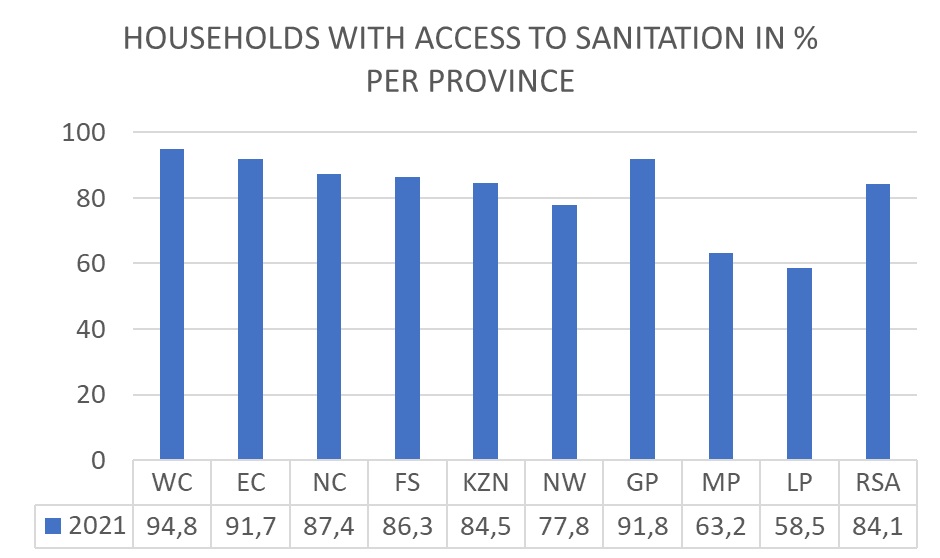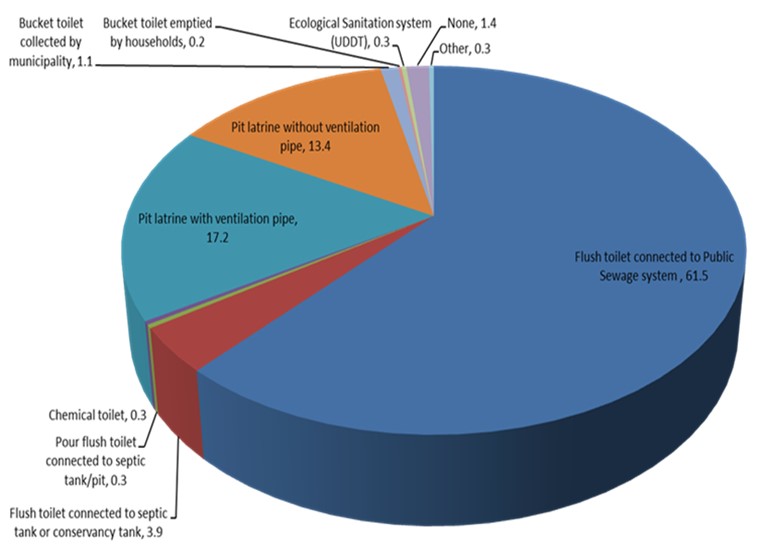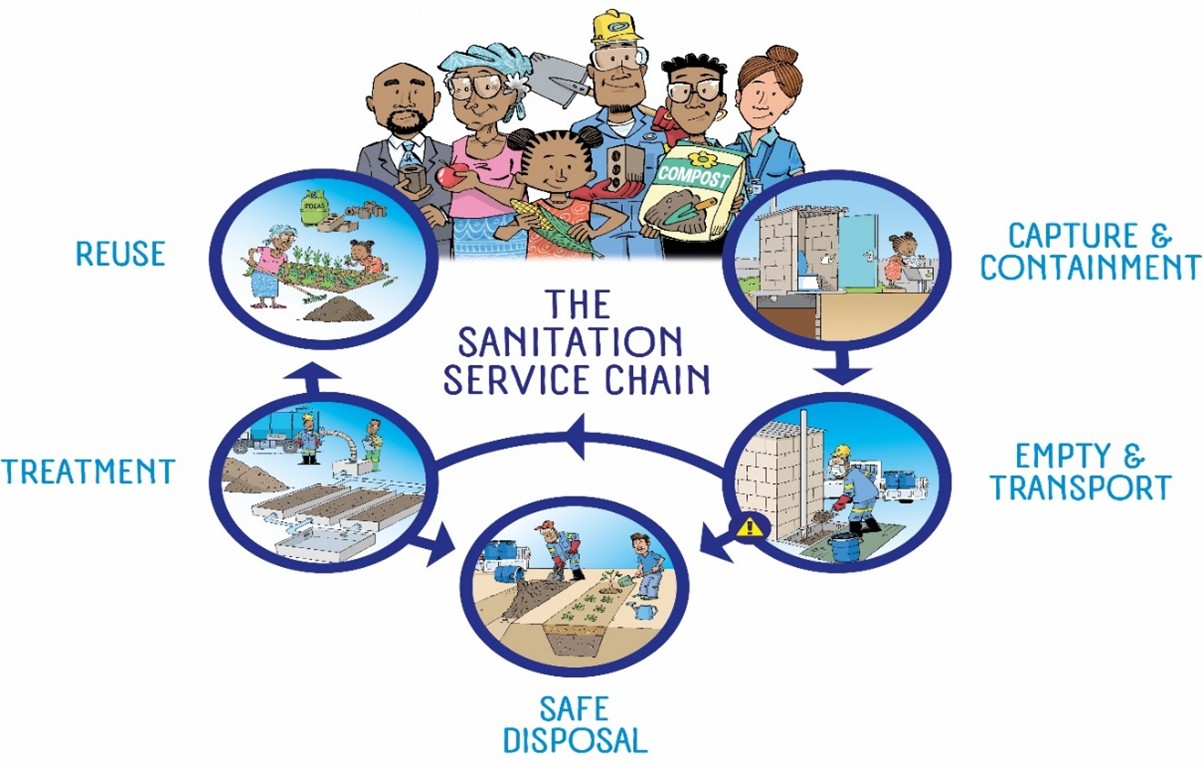THE RATIONALE FOR FAECAL SLUDGE MANAGEMENT
1. The United Nations (UN) General Assembly has declared access to safe clean drinking water and sanitation as a basic human right in September 2010. South Africa is committed to achieve the Sustainable Development Goal (SDG) 6.2 target on Sanitation and Hygiene which states that “By 2030, achieve access to adequate and equitable sanitation and hygiene for all and end open defecation, paying special attention to the needs of women and girls and those in vulnerable situations”. The SDG target 6.2 has a global indicator 6.2.1 which is measured by a proportion of population using safely managed sanitation services including hand washing facility with soap and water..
2. Beside the SDG targets, Government’s plan for provision of basic services such as water, sanitation and hygiene education to the people is guided by the National Development Plan (NDP) as a blueprint until 2030.
3. According to General Household Survey 2022, 84.1% of the household in South Africa have access to a basic level of sanitation in 2021.

|
| Fig 1: Household with access to Sanitation per province (STATSSA 2022) |
| |
4. A larger proportion (61%) of households are served with full flush toilets (waterborne sanitation) which are toilets connected to the sewer network and wastewater treatment works. The conventional sewer system is no longer sustainable due to water constraints in the country, the impact of climate change and its dependency on energy (electricity) unless it’s an oxidation pond. The remaining 38,5% of households utilise various types of on-site sanitation systems (STATSSA, 2022). Thus, over a third of South African households need faecal sludge management services to ensure access to functional, hygienic and reliable sanitation services.

|
| Fig 2: Sanitation Systems used in South Africa (STATSSA 2022) |
| |
5. Previously the priority was on ensuring access to sanitation services with little attention given to operation and maintenance for on-site sanitation. This resulted to approximately 10% (7 million) on-site sanitation systems full, with no plans to manage full containments /pits. This created a risk to revert to open defaecation. In addition, there are challenges related to lack of appropriate places to dispose of faecal sludge, long distances to hazardous landfill sites as these are few in the country, and illegal dumping of untreated faecal sludge into the environment.
6. The department in consultation with the sector, has developed the National Faecal Sludge Management Strategy (FSM) to guide the sector on safe management of faecal sludge to enhance operation and maintenance of on-site sanitation systems, prevent groundwater contamination, safeguard public health, and protect the environment from pollution throughout the sanitation service chain. The Strategy presents a shift in focus towards managing the sanitation facilities that have been delivered by government to ensure longevity.7.
7. Due to the impact of climate change and limited water availability, the country is moving towards a new era of managing sanitation services differently such as, adoption of alternative sanitation systems that are non-sewered, off grid and use minimum or no water; beneficial use of wastewater and faecal sludge; and safe management of the sanitation service chain. This paradigm shift required the department as sector leader to support the sector in the safe management of faecal sludge of sanitation across the whole sanitation service chain. Figure 3 illustrates the sanitation service chain.
8. The National FSM Strategy is important for ensuring the appropriate implementation of the National Sanitation Policy of 2016, which encourages recovery, recycling and beneficial use of sludge. The Strategy will assist key role players to safely manage faecal sludge from on-site sanitation safely across the sanitation service chain. It will create awareness and build a culture which recognises the benefits of treating human waste as a resource rather than a waste and liability.
9. The Strategy was approved by the Minister of Water and Sanitation and is currently rolled out to all provinces for implementation. Since this is a relatively new concept in the sector, the Department is also developing educational and awareness materials to conscientize and educate all key role players to safely manage faecal sludge across the sanitation value chain. The materials will be used as part of the sanitation advocacy programme to enable successful implementation of the National Faecal Sludge Management Strategy for on-site sanitation systems.
10. SA has recognised the need to pursue resource recovery, recycling and beneficial use of human waste, and is currently exploring approaches of expanding sanitation economic opportunities throughout the entire sanitation service chain.
DWS is developing faecal sludge management financial mechanisms and economic models to facilitate transition from linear economy to circular economy and to ensure financially sustainable sanitation services in accordance with National Sanitation Policy (2016). Figure 3 below illustrates the sanitation service chain and circular economy:

|
| Fig 3: Sanitation service chain and circular economy |
| |
By-products from wastewater sludge and faecal sludge can create potential business employment opportunities. Beneficial use can create an environment and public health spin-offs and can further generate financial savings for municipalities. Beneficial use diverts sludge from landfill sites prolonging their useful lifespan, as required by the Department of Forestry, Fisheries, and the Environment.
Economic models would be developed for each treatment options namely; co-treatment in waste water treatment works (WWTW), co-composting, deep row entrenchment, decentralised wastewater treatment, faecal sludge treatment plant, repurpose WWTW to faecal sludge treatment plant (FSTP), Black Soldier Fly, planted drying beds, thermal drying and pelletizing.